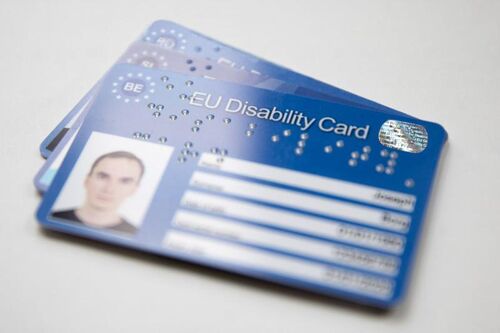Agreement on the European Disability Card: major advance for freedom of movement
February 9 2024, 09:19am

On Thursday 8 February, the European Disability Forum (EDF) issued a statement marking the provisional agreement on the European Disability Card achieved by EU Institutions. This provisional agreement, reached in record time, means that the final text of the Card can be voted on before the end of the legislative term. This clears a huge hurdle in making the Card a reality.
While the European Disability Card will not meet all the demands of the disability movement, EDF welcomes its many positive points, especially:
- Inclusion of transport services, even if some exceptions will apply.
- Inclusion of provisions to access support when taking part in EU Mobility Programmes.
- The European Disability Card will be issued and renewed free of charge.
- EU-level website and national websites with information on the Card.
- Safeguards to protect the Cardholders’ privacy.
- That Member States can decide to extend the use of the Card to longer stays.
In addition, negotiators achieved a commitment from the European Commission to further explore remaining gaps related to the free movement of persons with disabilities, such as the portability of disability-related support when moving to another EU country.
However, there is disappointment that some of EDF's demands were not included:
- Temporary access to disability support and allowance when persons with disabilities move to work and study abroad. As it is, persons with disabilities might not have access to support while undergoing lengthy “reassessment” processes. The European Disability movement will continue its fight for full freedom of movement.
- EU funding to support the actual implementation of the Cards by the Member States.
- We are also disappointed that an exception was made that will allow us to exclude some specific services in case the special access or discounts provided are dependent on additional assessments.
EDF also regrets the long deadlines for transposition and implementation are. EU Member States will have 42 months to start providing the Cards, including 30 months to transpose the legislation (that is to create national laws to obey it). This means that the Card will only fully become a reality in 4 years.
European Parking Card
Regarding the European Parking Card, EDF welcomes:
- A clear timeframe for how long public authorities can take to deliver the Card to avoid long waiting times.
- Possibility to include digital features to prevent fraud, such as QR Code.
- Inclusion of Braille on the physical card.
EDF notes that this agreement paves the way to the speedy conclusion of the proposal to extend the Cards to third-country nationals who reside in EU countries.
The final text still needs to get formal approval from the Council of the EU and the European Parliament, followed by publication in the EU official journal. Then, the deadlines mentioned above will begin.
EDF will publish a more detailed analysis of the text once the final version has been approved by the European Parliament’s Plenary in April 2024.
Yannis Vardakastanis, President of the European Disability Forum, said, “This is a momentous victory for the disability movement, that campaigned for this Card for over a decade. We expect this Card to be well implemented and that it becomes a cornerstone for citizens with disabilities’ full inclusion in the European project.”
The European Disability Forum is an umbrella organisation of persons with disabilities that defends the interests of 100 million Europeans with disabilities. EDF is a unique platform that brings together representative organisations of persons with disabilities across Europe. It is run by persons with disabilities and their families. EDF is a strong, united voice of persons with disabilities in Europe. DFI is a member of EDF.
ENDS
